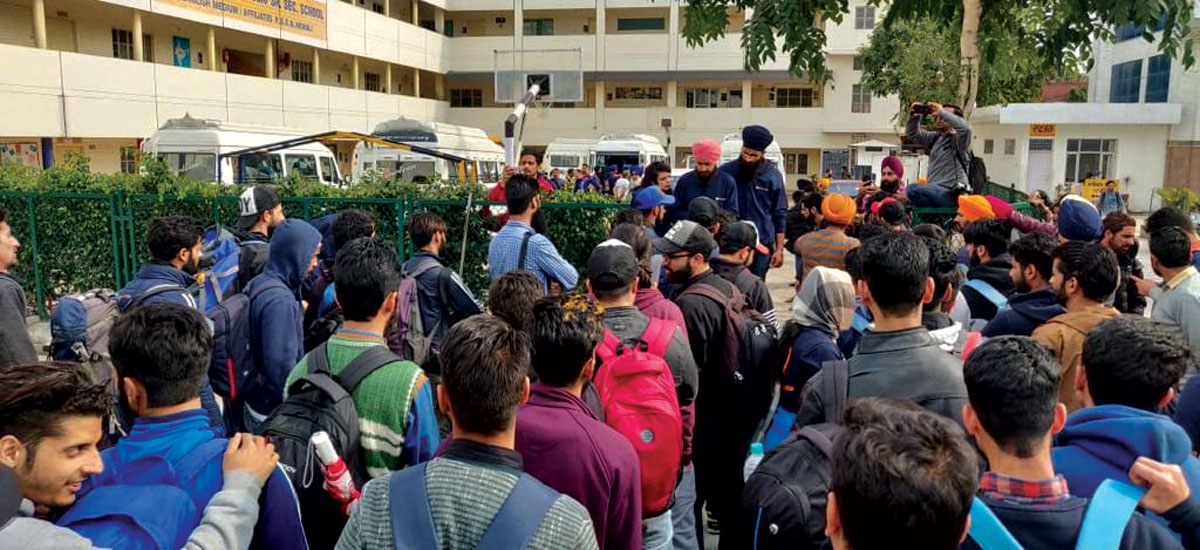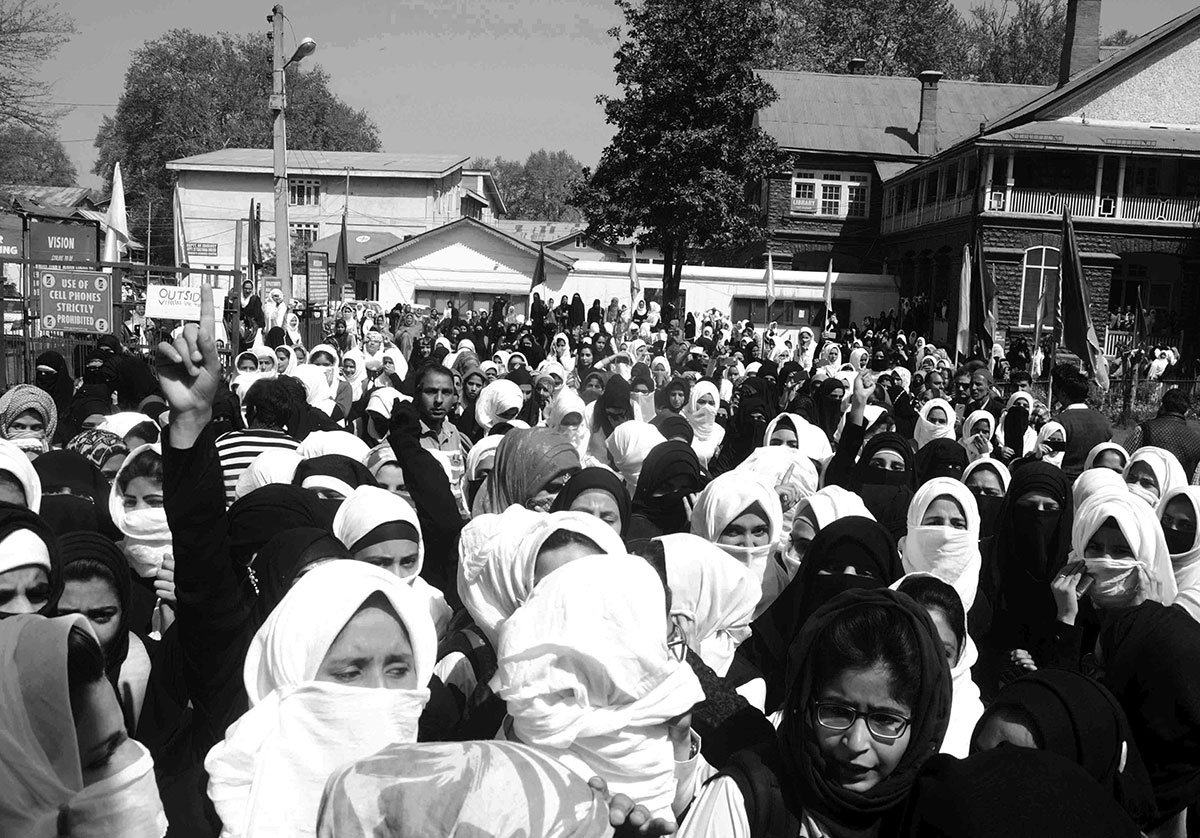Owing to the disruptive education in Kashmir, tens of thousands of students migrate out to pursue studies. But the situation back home is chasing them, there, as well. This is pushing the youth to a devil-and-deep sea situation, reports Zainab Shafiq

When a militant was killed in a June 2017 encounter, Aniqa Shah accompanied her classmates out of the college as authorities ordered quick premises evacuation. “The college authorities didn’t even think about our safety!” regrets Shah.
A second-year undergraduate student at Women’s College MA Road in Srinagar, Shah, 21, rushed towards her Chanapora home and was caught in stone-pelting for almost four hours. “It was a horrible experience and I was really scared.”
In a conflict-ridden Kashmir, students suffer the most. Frequent shutdowns, interrupted facilities and a threat to life have pushed many students into depression or other mental health issues.
“I get frustrated because of the situation,” Shah said. “In my course, we don’t have many books and we are dependent on the internet. When it is snapped, I feel caged. It’s traumatic and stressful. One already has too many problems and then you have to worry about your career as well.”
Mobile internet service is snapped literally on the drop of a hat. “It becomes difficult to study. And when there’s no internet I feel suffocated,” said Fatima, a first-year student of Chemical Engineering at NIT, Srinagar.
“A Kashmiri student lives his whole life in uncertainty. You never know what may happen, if the examination will be conducted or not. We have never been introduced to something new, any activities, or anything to show our talent or skills. We are asked to stick to our academics and nothing else,” lamented Fatima.
Going to school or a college is linked to what would have happened the previous day. “Class work remains suspended most of the times because of which a major portion of the syllabus is left uncovered. To compensate for the loss, most of the times we have to study by ourselves or the untaught topics are given to us as assignments,” said Sehar Iram, a final-year engineering student at IUST, Awantipora.
These are the compelling reasons why a lot of students migrate outside the valley for studies. “I believe Kashmir lacks a quality education,” Sofi Azhar Amin, a Baramulla resident who is in the final-year of Business administration at Maharashtra Institute of Technology, Pune. “When you move out, you gain more experience. You learn how to be independent. The standard is higher. There are field visits. You are taken on industrial visits. Paid internships are offered in many places. There are numerous inter-college events.”
A first-year BDS student at Institute of Dental Sciences, Kunjwan, Jammu, Zufisha Riyaz Khan from Srinagar, is of the same opinion. “The level of exposure is great. We get to learn about our strengths and skills as students. We are taught how to manage our time, and most importantly, the study doesn’t feel like a burden and isn’t about cramming anymore.”
It is this trend that was seriously compromised in the aftermath of the Lethpora car bomb in which 49 CRPF personnel were killed. In parts of North India, Kashmiri students were pushed into serious insecurity and humiliation as Hindutva brigade mounted a hate campaign.
Over 300 Kashmiri students have left their institutions in Rajasthan, Uttrakhand, Punjab, Haryana and many other places and reached home in convoys arranged by concerned NGOs and individuals in Punjab. Around 19 students studying in various colleges have been expelled. Officials said more than 21000 students from Kashmir study in North Indian educational institutions.

Salman Shaheen Charoo has been a student and later became a teacher in Lovely Professional University (LPU), Punjab. A resident of Sopore, he did his B Tech (Civil Engineering) and a diploma in English from LPU where he eventually started teaching English. He has been living an incident-free life in Punjab for five years.
Everything had been going well, but things took a turn for the worse after the Lethpora attack. “One of my students from Uttar Pradesh was promoting violence on social media and abusing Kashmiris. Initially, I decided to ignore it, but at one point it became unbearable,” Shaheen said. He simply asked her to promote peace and not violence and have equal sympathy with all. “But the student is a CSC student with exceptionally great knowledge of Photoshop and she added, ‘What you sow, so shall you reap and this attack is an answer to your actions against Kashmiris,’ to my text and circulated it in the whole university.”
Since everybody had started talking about the text, Charoo decided to approach his HOD who asked him to wait till morning. Fearing the crowd that had gathered outside his building, he applied for leave and stayed in his apartment. The next day, he took a cab to the pro-chancellor, Rashmi Mittal’s office. “After talking to two of my teachers who told her that I would never write any such thing, she called those two students who had circulated the text. And they framed their story in such a way, that it appeared that I was at fault. She then asked me to resign.”
Shaheen put in his papers. Accompanied by his roommate Sajid Jameel, a final-year Biotechnology student at LPU, from Doda, he came home.
Sajid recounts that on their way back, some people started following them. “As soon as we reached our apartment, we locked the door and entered through the window. We even switched off the lights. After about five minutes we heard people shouting that they were going to beat us. We were really scared and locked ourselves in the washroom,” he said.
From there, the duo made various calls to Punjab Police and helpline numbers. After 45 minutes, around 30-35 police vans had gathered outside their building and the people ran away. “We then booked an Ola to Chandigarh for Rs 3700 and took a flight to Srinagar at Rs 12000 each.”
As the convoys carried frightened students from parts of North India back home, the tensions are still running high. While sections of the student who are nearing completion of their degrees are saying they will return to their campuses, those who had recently started are tense. Some of them are so frightened that they may not go back. How will they continue their studies, it is a question for the society back home and the government.
It was after the Supreme Court directed the states to ensure the safety of Kashmiri students that the Prime Minister publicly spoke saying the battle is for Kashmir and not against Kashmir; this changed the situation to some extent. Even though Omar said that hate attacks still continue but the situation has started changing. A section of the students has started thinking about going back to complete their degrees. Besides, the situation that emerged in the wake of air strikes has also pushed the hate campaign aside.















